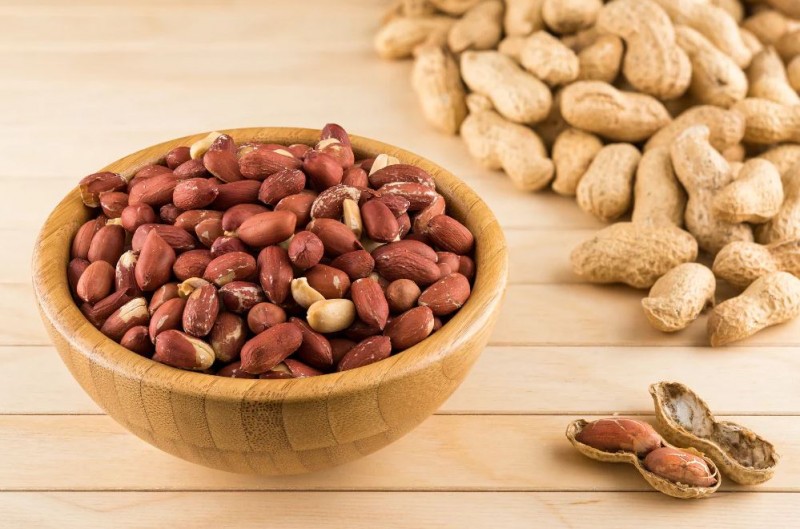
In the winter season, the popularity of peanuts, colloquially known as "moongfali" in Hindi, rises as people seek a tasty and affordable snack option. While peanuts offer a myriad of health benefits, it's crucial for individuals with specific health conditions to exercise caution, as their consumption could pose potential risks. This detailed guide explores the nutritional benefits of peanuts and delves into the reasons certain individuals, such as those with acidity issues, arthritis, high blood pressure, allergies, or weight management concerns, should approach peanut consumption with care.
The Nutritional Benefits of Peanuts
1. Protein Prowess
Peanuts are a protein powerhouse, making them an excellent option for individuals seeking plant-based protein sources. The protein content in peanuts supports muscle maintenance and overall bodily functions.
2. Energizing Carbohydrates
With a significant carbohydrate content, peanuts provide a quick and sustainable energy source, making them an ideal snack for those needing a boost during the day.
3. Digestive Health with Fiber
Peanuts are rich in dietary fiber, promoting healthy digestion and aiding in bowel regularity. Fiber is essential for maintaining a well-functioning digestive system.
4. Iron for Vitality
An important source of iron, peanuts contribute to healthy blood circulation, ensuring that the body receives an adequate supply of oxygen.
5. Essential Fatty Acids
Peanuts contain essential fatty acids, contributing to overall well-being by supporting brain health and maintaining healthy skin.
Who Should Exercise Caution?
1. Acidity Issues
Understanding the Concern:
Individuals prone to acidity problems should be cautious with peanut consumption. Peanuts can potentially disrupt digestion, leading to increased gas, abdominal discomfort, and bloating.
The Impact of Excessive Intake:
Excessive consumption of peanuts may exacerbate acidity issues, causing discomfort and negatively affecting digestive health.
Mitigation Strategies:
Moderation is key for individuals with acidity concerns. Smaller portions and mindful eating can help mitigate potential digestive disturbances.
2. Arthritis and Joint Pain
Understanding the Concern:
Peanuts contain lectins, compounds that may intensify pain and swelling in joints. Individuals with arthritis or joint pain should be aware of this potential impact.
The Impact of Excessive Intake:
Consuming peanuts in excess may contribute to increased joint pain and inflammation, worsening symptoms for those already dealing with arthritis.
Mitigation Strategies:
Considering alternative snacks with lower lectin content can be beneficial for individuals with arthritis. Consulting with a healthcare professional for personalized advice is advisable.
3. High Blood Pressure
Understanding the Concern:
Peanuts contain sodium, which, when consumed in excess, may contribute to elevated blood pressure levels. Individuals with hypertension should monitor their sodium intake.
The Impact of Excessive Intake:
High sodium levels can exacerbate high blood pressure, increasing the risk of cardiovascular issues for those already dealing with hypertension.
Mitigation Strategies:
Moderation is crucial for individuals with high blood pressure. Choosing unsalted peanuts or other low-sodium snacks can help manage sodium intake effectively.
4. Allergies
Understanding the Concern:
Peanut allergies can lead to severe allergic reactions, including itching, swelling, nausea, vomiting, and difficulty breathing. Individuals with known peanut allergies should strictly avoid peanuts.
The Impact of Excessive Intake:
For those with peanut allergies, even small amounts can trigger life-threatening reactions, necessitating immediate medical attention.
Mitigation Strategies:
Complete avoidance of peanuts and peanut-containing products is essential for individuals with peanut allergies. Reading food labels and informing others about the allergy is crucial to prevent accidental exposure.
5. Weight Management
Understanding the Concern:
For individuals focusing on weight management, the calorie and fat content in peanuts may pose challenges if not consumed in moderation.
The Impact of Excessive Intake:
Regularly consuming large quantities of peanuts may contribute to unwanted weight gain, hindering weight management efforts.
Mitigation Strategies:
Portion control and mindful eating are key for individuals managing their weight. Incorporating peanuts into a balanced diet in appropriate amounts can be part of a healthy eating plan.
Peanuts, with their rich nutritional profile, can be a valuable addition to a balanced diet for many individuals. However, those with specific health conditions need to be mindful of potential risks associated with peanut consumption. By understanding these concerns and adopting moderation, individuals can enjoy the benefits of peanuts while safeguarding their health. Consulting with healthcare professionals for personalized advice is recommended, ensuring that dietary choices align with individual health needs and goals.
Let Mango and Lemon Take a Break: Now Papaya Takes Spotlight in Pickle Making! Here's Recipe
Here's How to Recognize the Hidden Dangers of Repeatedly Using the Same Glass for Drinking Water